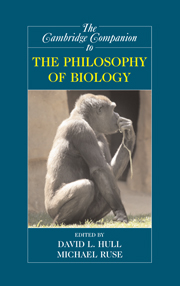Book contents
- Frontmatter
- 1 Adaptation
- 2 Population Genetics
- 3 Units and Levels of Selection
- 4 What’s Wrong with the Emergentist Statistical Interpretation of Natural Selection and Random Drift?
- 5 Gene
- 6 Information in Biology
- 7 Reductionism (and Antireductionism) in Biology
- 8 Mechanisms and Models
- 9 Teleology
- 10 Macroevolution, Minimalism, and the Radiation of the Animals
- 11 Philosophy and Phylogenetics: Historical and Current Connections
- 12 Human Evolution: The Three Grand Challenges of Human Biology
- 13 Varieties of Evolutionary Psychology
- 14 Neurobiology
- 15 Biological Explanations of Human Sexuality: The Genetic Basis of Sexual Orientation
- 16 Game Theory in Evolutionary Biology
- 17 What Is an ‘Embryo’ and How Do We Know?
- 18 Evolutionary Developmental Biology
- 19 Molecular and Systems Biology and Bioethics
- 20 Ecology
- 21 From Ecological Diversity to Biodiversity
- 22 Biology and Religion
- 23 The Moral Grammar of Narratives in History of Biology: The Case of Haeckel and Nazi Biology
- Reference List
- Index
- Series List
20 - Ecology
Published online by Cambridge University Press: 28 April 2008
- Frontmatter
- 1 Adaptation
- 2 Population Genetics
- 3 Units and Levels of Selection
- 4 What’s Wrong with the Emergentist Statistical Interpretation of Natural Selection and Random Drift?
- 5 Gene
- 6 Information in Biology
- 7 Reductionism (and Antireductionism) in Biology
- 8 Mechanisms and Models
- 9 Teleology
- 10 Macroevolution, Minimalism, and the Radiation of the Animals
- 11 Philosophy and Phylogenetics: Historical and Current Connections
- 12 Human Evolution: The Three Grand Challenges of Human Biology
- 13 Varieties of Evolutionary Psychology
- 14 Neurobiology
- 15 Biological Explanations of Human Sexuality: The Genetic Basis of Sexual Orientation
- 16 Game Theory in Evolutionary Biology
- 17 What Is an ‘Embryo’ and How Do We Know?
- 18 Evolutionary Developmental Biology
- 19 Molecular and Systems Biology and Bioethics
- 20 Ecology
- 21 From Ecological Diversity to Biodiversity
- 22 Biology and Religion
- 23 The Moral Grammar of Narratives in History of Biology: The Case of Haeckel and Nazi Biology
- Reference List
- Index
- Series List
Summary
INTRODUCTION: UNDEAD DOGMAS OF EMPIRICISM
I suspect the demand for evidence about individuals is a bastardized version of an old positivist claim: the claim that theoretical terms must be defined in observational ones, in particular individual sensory experiences.
Kincaid 1996, 182The philosophy of biology has matured quite a bit over the last two decades. Back in 1988, Ruse noted a conspicuous dearth of work on ecology. But by 1999, Sterelny and Griffiths devoted an entire chapter to it in their introduction to the philosophy of biology. There is still plenty of room, and reason, for more philosophical attention to a science so vital for understanding and addressing environmental concerns. But at least several people now make philosophy of ecology their academic specialty.
In the following I shall very briefly survey recent developments in both ecology and the philosophy thereof. One important aspect of the developments within ecology is an expansion to larger spatiotemporal scales of investigation. This wider focus has often, though not always, resulted in a shift in perspective, from viewing ecological entities as closed systems to treating them as open systems. I will take a closer look at three examples of scale expansion and tease out some of their implications for environmental policy, on one hand, and still-common reductionist philosophies of science, on the other. Finally, I will consider the philosophical implications of the search for mechanisms, when the open nature of the systems under study is acknowledged.
- Type
- Chapter
- Information
- The Cambridge Companion to the Philosophy of Biology , pp. 372 - 387Publisher: Cambridge University PressPrint publication year: 2007
- 2
- Cited by

